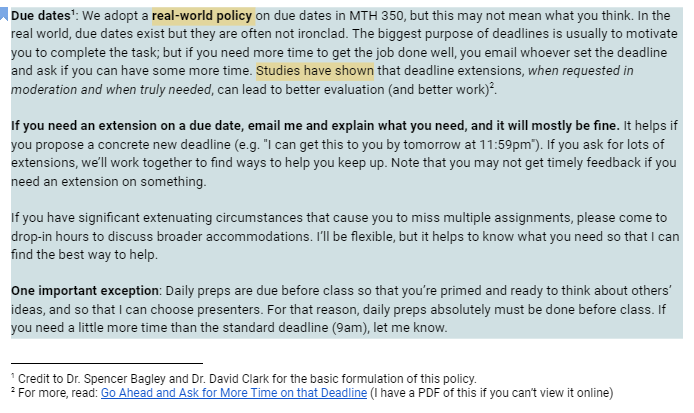A real world approach to deadlines

The new semester is about two weeks old, and you know what that means: The startup phase is over and the first assignments are about to start rolling in. And that means that deadlines on assignments are going to become an issue, not just for students but for us instructors as well. Deadlines are almost as unpleasant to deal with as grades. What's the best way to handle them?
The main school of thought on deadlines is that assignments should have them, and that they are inviolable once set: no late work accepted, no extensions granted except for truly extenuating circumstances, and in that latter case you'd better be prepared to document things. If grandma dies, bring in the program from the funeral. (I wish I were kidding about that.) Why is this the main school of thought? Many instructors would say it's because that's how deadlines work in the real world. In a real job, you won't be able to push off the big deadlines. So we're doing students a favor, actually, by insisting on ironclad deadlines.
But are we? And is this really how the real world works? A recent article in the Harvard Business Review suggests that maybe the real world doesn't actually work the way that professors think it does. The article, written by Prof. Ashley Whillans at the Harvard Business School, summarizes a series of studies done on deadline extensions in the workplace, whose results come from the business world but have a direct connection to the work we do with students --- and the work students do for us.
Just how fixed are fixed deadlines?
First, the idea that deadlines in the real world are immutable, appears not to be all that true. In a survey of over 1000 working adults in the United States, respondents said that just under half of their important work deadlines were adjustable. No word on what proportion of unimportant deadlines is adjustable.
This seems like a strange thing to say, since for many of us the definition of an "important deadline" is "a deadline that can't be adjusted". How can a deadline be truly important but also flexible? Prof. Whillans gives two answers to this that will ring true for all of us.
First, we often put deadlines on tasks or projects not because they must be done by that date and time, but merely to indicate the time frame when we'd like for them to be done. I teach on Tuesdays, so I might have the task "Prep for Tuesday's class" and put a deadline of Friday on it --- not because I have to be ready for class by Friday, but because I want to have this out of the way by the weekend. In fact, the real deadline on that task is Monday, or if I'm pushing it, Tuesday morning.
Second, sometimes we put deadlines on tasks and projects even when there isn't even a set time frame for completion, as a "commitment device" to motivate us to work on them. The deadline is a stake in the ground that makes the task more concrete, giving me something that sticks in my mind as a flag that a thing needs to be done.
Important tasks and projects (like getting my Tuesday class ready) can have deadlines on them that fall into one or both of those categories. And in both of those cases, if push comes to shove, the deadline can be renegotiated. (Up to a point; the Tuesday class really does need to be ready to go by Tuesday at 11:30am and this is not negotiable.) And in those cases, it's not only possible but in some cases a good idea to ask for a deadline extension (including asking yourself for one).
Asking for extensions is tricky
But if so many important deadlines are adjustable, how come we don't see more people asking for deadline extensions, either in the workplace or in school? What barriers to people encounter when thinking about one, or asking for one?
Prof. Whillans' team did more studies on this question. One of those studies took 900 full-time employees in the US and had them complete a writing task with a deadline. Participants could ask to have the deadline extended and were told that another participant would act as their manager, reading the work and evaluating it on the quality of the writing for a potential cash bonus. One group was told that the managers would be notified if they asked for an extension, and the other was told the manager wouldn't know if they asked.
The first group, the one that had the ability to ask for a deadline extension but knew that their supervisor would know if they asked for one, was 31% less likely to ask for an extension even though they were told that the writing would be judged strictly on quality alone --- i.e. there would be no bias in the evaluation if they asked for an extension. Those who did ask for an extension, regardless of their knowledge of whether their supervisor knew if an extension was requested, gave longer and better written responses than those who did not get an extension.
In a follow-up study, over 1000 participants evaluated the written work from the first study and were told whether the writers asked for an extension --- while being told to rate the work on quality alone. The "supervisors" in this second study rated the deadline-extended submissions as higher quality and rated the participants who asked for an extension as more competent and motivated than those who did not.
So, one important barrier for employees asking for deadline extensions seems to be the belief that asking for one will make them look worse in the eyes of their supervisors. From the employee standpoint, the tendency is to view asking for deadline extensions as a negative thing. Maybe asking for an extension makes you look lazy, less competent, or less motivated. That perception is real. But it's also counter to what supervisors actually think, according to the second study.
Optimizing for the wrong variable
Now put yourself in the supervisor's position. If you have people working on a task or project, but it has a flexible deadline, which matters more to you: speed (getting the thing done on time) or quality (doing the thing right, even if it means taking more time)? Ideally, you'd want both; but if your workers had to sacrifice one for the other, which one matters more to you? And how much more? And, what do your workers think your answer is?
Another study by Prof. Whillans' team studied this situation. The study took 200 full-time employees and 200 managers and presented them with a hypothetical scenario where a task needed to be completed but the deadline was flexible. The managers were asked wither speed or quality was more important in that situation, and how much more. The employees were asked if they would request a deadline extention, and then whether they thought their managers preferred speed over quality, or vice versa, and by how much.
One of the purposes of the study was to compare what employees think their supervisors prioritize with what the supervisors actually prioritize. And it found thatemployees consistently overrated how much the managers prioritized speed over quality and this perception drove their decision whether or not to ask for a deadline extension. Either the managers cared more about quality than speed, and the employees thought it was the opposite; or the managers actually did prefer speed over quality but not to the extent that employees thought.
Prof. Whillans explains it this way (my emphasis):
Research has shown that people tend to optimize for metrics that are easily quantified, such as completion time, rather than more qualitative (yet often more relevant) measures of performance, such as how well-written or insightful the final product is. Managers and employees alike generally see time management skills as the hallmark of a top performer, and the ability to use time efficiently is widely viewed as a signal of competence, ability, and even social standing. As such, it is hardly surprising that many employees worry that asking for more time will make them seem incompetent and inefficient — even though our data shows that the opposite is often true.
What this means for teaching
These studies are another excellent example of where we in higher education can learn a lot from our colleagues in, or near, the business world if we have ears to hear.
A main lesson from this research is that we really can't justify a hard-line approach to deadlines on class assignments based on "That's how the real world works". Because this is not always how the real world works. In the real "real world" (or, at least, in studies that involve actual workplaces), a large portion of "important" deadlines can be moved, because the deadlines were sort of arbitrary in the first place --- they don't signify actual, non-negotiable times/dates for completion.
I suspect that the deadlines on most, if not all assignments in a given class are not real deadlines, but "time frames" or "commitment devices". Or, perhaps, they are classroom management hacks --- dates on the calendar that allow us instructors to have a predictable schedule for course prep and grading. None of these suggest we should do away with deadlines; but the fact is that deadlines set up for these reasons are not immutable, and we should be prepared to flex those deadlines if there is good reason. And the promise of better work from students ought to be reason enough.
In general, how we could help ourselves and our students with respect to deadlines is:
- Be clear with ourselves and students about which deadlines are really fixed, and which can be adjusted. For example, put a clear policy on this in the syllabus or on the course calendar, and communicate it often.
- Have a clear policy that describes how and when to ask for a deadline extension, including what's needed from the student to make a successful request.
- Communicate clearly with students that asking for a deadline extension when one is offered does not reflect badly on them, or penalize them. Communicate clearly that you prioritize quality over timeliness within reasonable limits.
So in other words, it's yet another instance where clear communication solves most pedagogical problems.
I used to be unapologetically old-school with my deadline policies. Then as I implemented specifications grading more, I shifted to what I called the quota/single deadline approach --- basically doing away with all deadlines. Over time, though, my students have taught me that having no deadlines is almost as stressful as having lots of immutable ones, because the students really need that "commitment device", the thing on the calendar that gives them something concrete to think about. That lesson was especially clear during the first year of the pandemic, when the need for motivation was at an all-time high.
Prof. Whillans' HBR article came out in December, just as I was starting to put together my Winter 2022 Modern Algebra course, and it couldn't have come at a better time. After reading her team's research, deadlines have made a comeback in my classes. But I've also paired them with the following syllabus language:

It's still early, but so far nobody has asked for a deadline extension. I assume that someone eventually will. When it happens, for the most part, I will just say "Yes". There's no need for documentation or even explanation --- no more asking for brochures from the funeral home if someone dies. Instead, I'll ask the student to give me a plan for when the work will be done, and if there's anything else I can do to help --- or if there's a larger pattern of extension requests that hints at something bigger at play --- we'll talk about that. But that's it.
I think this approach goes a long way to treating students more like actual human beings, and especially toward building trust. My experience from 25+ years of past classes tells me that students generally want to get their work done and to do a good job with it. But when there is a conflict between doing work that's good and doing work that's on time, they will (as Prof. Whillans' work says) optimize for the easier metric, i.e. sacrifice quality for timeliness rather than vice versa. So it's on me to make it clear that timeliness is not the primary criterion for success. And this humanizes the proceedings in a way that makes everything better.


